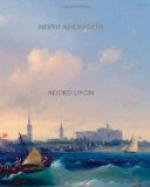“We have the keenest kind of competition,” was the reply—“a competition of the highest order that brings the most joyous life-activity into our work. Each steward competes with every other steward to see who can improve his stewardship the most and bring the best results to the general storehouse. For example, you noticed as you came into the city the beautifully kept gardens and farms lying for miles out into the country. These are all stewardships, and there is the keenest competition among the farmers and gardeners to see who can make the land produce—first the best crops, and then the most of that best. One man last year who has a small farm turned into the storehouse as his surplus one thousand bushels of wheat. It was a remarkable record which this year many others are trying to equal or exceed. This sort of rivalry is found among all the various businesses and industries in Zion and her stakes; so you see, that even what you term the wealth producing incentive is not lost to us, but is used as an end to a mighty good, and not to foster personal greed.”
* * * * *
The three strolled farther away from the large factory building, out into a section where residences stood here and there among the trees in the park-like grounds. Approaching a beautiful sheet of water bordered by flowering bushes, lawns, and well-kept walks, they saw a man sitting on a bench by the lake. As his occupation seemed to be throwing bread crumbs to the swans in the water, the King and his companion concluded that here, at last, they had discovered one of the idle rich, whom they still had in their own country. Remand expressed his thought to the guide.
“He idle?” was the reply. “Oh, no; he is one of our hardest working men. That is one of our most popular writers, and in many people’s opinion, our best. We must not disturb him now, but we will sit down here and observe him. We are told that when he is planning one of his famous chapters of a story, he comes down to this lake and feeds the swans.”
“And do you still write, print, and read stories?” asked Remand.
“Certainly. Imaginative literature is one of the highest forms of art. This man has most beautifully pictured the trend of the race, his special themes being the future greatness and glory of Zion. Why should he not paint pictures by words, as well as the artist who does the same by colors and the sculptor by form? If you have not read any of his books, you must take some of them home with you. See, he is moving away. Would you like to meet him?”
They said they would. The author was soon overtaken, and he received his visitors graciously.
“Yes,” he laughingly acknowledged to Paulus, “you caught me fairly. I was planning a most interesting scene of the book on which I am now engaged, and the swans are a great help.”
He led his visitors into the grounds surrounding his home, and then into his house. He showed them his books, his studio, and his collection of art treasures. From an upstairs balcony he pointed out his favorite bit of landscape, a mixture of hill and dale, shining water, and purple haze in the distance.




